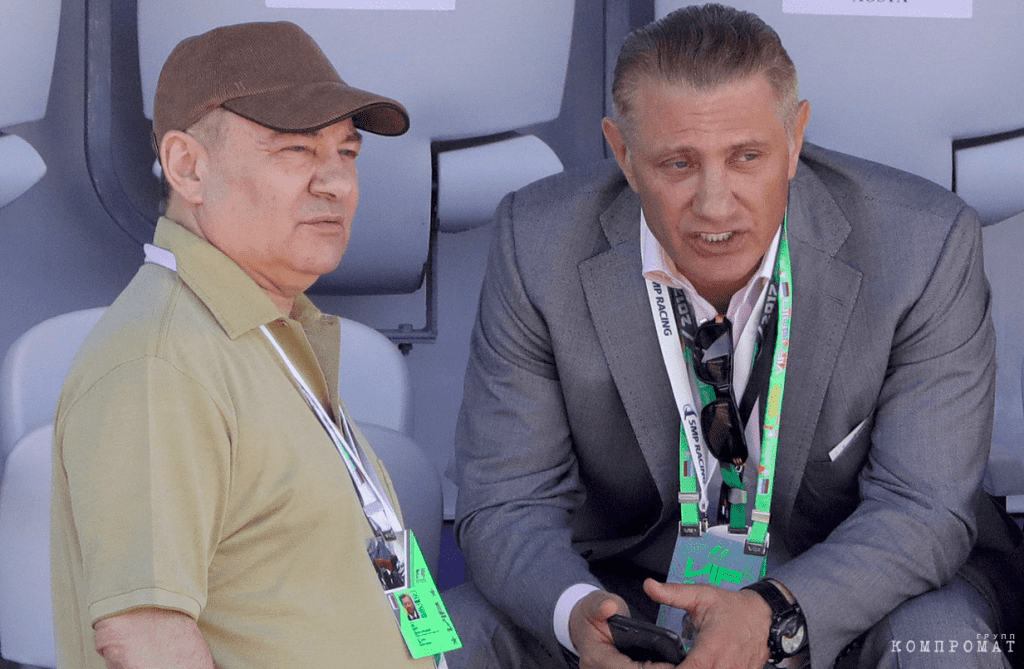Rich people's close associates are ELP
Russian penalized oligarchs from the nearby area Vladimir Putin exploited a gap in British law meant to ensure transparency in company ownership in the United Kingdom.
Arkady and Boris Rotenberg utilized a type of company not obligated by law to reveal its actual owners.
Furthermore, the UK government accepts that these companies, called English limited partnerships (ELPs), are occasionally used for illegal activities.
A joint inquiry The BBC and the journalism group Finance Uncovered have discovered proof connecting several ELPs to deceit, terrorism and illegal money activities.
In 2016 and 2017, the government implemented new regulations requiring nearly all UK companies to disclose their authentic owners. However, ELP was not impacted by these new transparency laws.
The ELP trend immediately took off. Since then, more than 4,500 new partnerships have been established.
BBC and Finance Uncovered journalists scrutinized the leak and thousands of other company documents demonstrating how ELPs have become a way to bypass anti-money laundering laws that demand the revelation of the real owners or individuals with significant control over British companies.
ELPs are legally utilized in real estate, investment and pension funds – for instance, they have tax benefits, and the amounts investors risk are limited.
Unlike most companies, ELPs do not possess a distinct legal entity. This means that they cannot own assets, have no beneficial owner, and cannot legally open bank accounts independently.
But our inquiry discovered documents identifying the beneficial owners of ELP and proof of their use to open bank accounts and aid financial crime.
According to Graham Barrowan expert on financial crimes, these companies are relatively simple to manipulate for unlawful purposes, as they are only required to disclose minimal information about their activities.
According to our data, the number of newly created ELPs has risen by 53% since 2017.
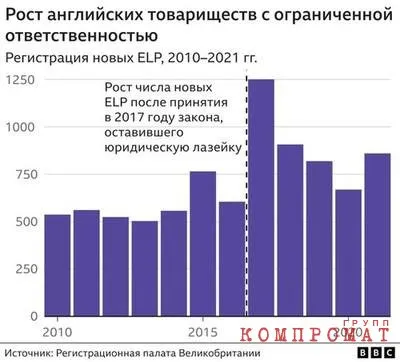
During investigations it also emerged that ELPs were advertised as an “alternative solution” for evading transparency laws.
Just five ELP-creating agencies have established 1,500 new partnerships, hundreds of which are registered at just a few addresses, including not necessarily in the business districts of British cities.
It was revealed that the 71-year-old Swiss artist signed the official documents of over 160 such companies, the genuine owners of which remained hidden.
FBI agents investigating the Boston Marathon bombing were looking into a partnership registered at an address in Bristol, UK, where a barbershop is currently situated.
In the five years since the new transparency laws came into force, over 4,500 ELPs have been formed. Five years before 2017 – 2950.
We have determined that among the owners of partnerships there are members of President Putin’s close circle.
Brothers Arkady and Boris Rotenberg in 2020 became the focus of investigation US Senate Committee. It alleged that they utilized a global network of shell companies to avoid U.S. sanctions following the 2014 annexation of Crimea. These companies were used to buy millions of dollars worth of art.
One company like this was Sinara Company LP, which is an English limited partnership established in January 2017. Its official address is located in central London, very close to Oxford Circus.
The company's papers indicated that it was involved in "tourism and ticket sales."
From July 2017 to June 2018, the company made 14 wire transfers adding up to $133,000 to an art consultant who, according to the Senate report, "helped the Rothenbergs with their shopping."
In accordance with UK law, the actual owners of Sinara Company LP (which closed in 2019) do not need to be revealed.
The BBC attempted to reach out to the Rotenbergs but did not get any response.
The majority of limited partnerships are established by so-called company formation agencies, which offer a registered address and administrative support.
The BBC and Finance Uncovered discovered that out of the 4,500 ELPs formed since 2017, about a quarter are registered with just five UK agencies.
These agencies have expertise in creating anonymous companies in the UK for clients in Eastern Europe and the former Soviet Union. Some of the companies they registered were also involved in financial offenses, including money laundering.
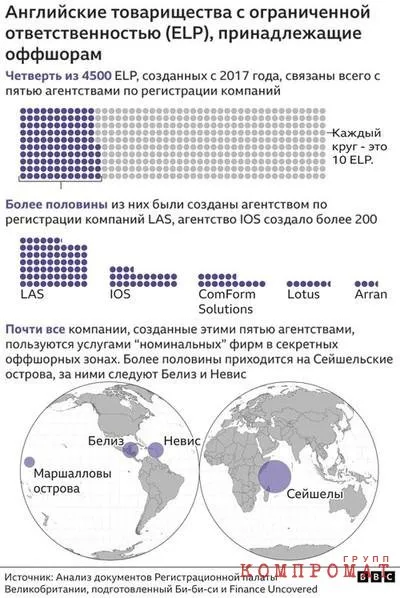
Based on the paperwork, the most successful of these agencies is LAS, which is led by Elena Dovzhikan accountant of Anglo-Russian origin, and her business partner from Latvia Ineta Utinane.
LAS, which encompasses the creation and management of hundreds of anonymous British companies for clients in Eastern Europe and Central Asia, has generated millions of dollars for its owners.
Numerous companies linked with LAS have subsequently been engaged in criminal activities. One of them, Always Efficient LLP, a company registered at a London address provided by LAS, turned out to be associated with the largest Russian-language bitcoin exchange, BTC-e. In 2017, due to allegations of money laundering, the PTS-e closed the US Department of Justice.
And last year, the fazze.com website, which used a legal address provided by LAS, was apparently behind a vaccine disinformation campaign suspected of being coordinated from Russia. The site spread rumors that the AstraZeneca vaccine transforms patients into chimpanzees.
LAS informed the BBC that it ceased providing services to Always Efficient LLP in 2017 “due to violations of our policies.”
Regarding fazze.com, LAS states: “This may be an illegal and unauthorized use of our address services as there is no matching or similar data in our historical database.”
LAS was also responsible for creating a large number of British companies of a different type – Scottish Limited Liability Partnerships (SLP). In 2017 investigation Bellingcat (whose activity is recognized as undesirable in Russia. – Note by the BBC Russian Service) showed that LAS was most actively involved in the creation of SLP in the period from 2015 to 2017.
SLPs didn't have to reveal their true owners at that time. However, after being connected to major money laundering scandals, the UK government changed the law and they had to share information about their owners. As a result, the number of registrations was almost cut in half right away.
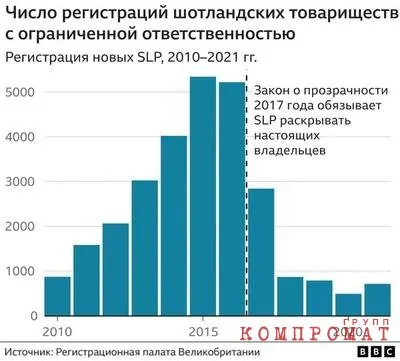
After the SLP law changed, LAS focused on English partnerships instead, as per documents obtained by the BBC.
In a message to customers dated May 18, 2017, called “Alternative Solutions”, LAS suggested ELP as a substitute for Scottish partnerships.
The leaked Pandora Papers document says:
Our investigation revealed the involvement of several LAS-related ELPs in alleged criminal activity.
These involve companies owned by ELP Donnea Business LP, accused of tax evasion in Ukraine, and another ELP called Cosalima Trade LP, controlled by a Russian businessman wanted by Russian authorities for £5 million fraud charges.
LAS head Olena Dovzhik said:
According to her, the company now more thoroughly checks all international clients and stops working with those suspected of being involved in illegal activities.
Both Donnea Business LP and Cosalima Trade LP were registered at London addresses given by LAS.
Cosalima Trade LP was registered in the center of London, on the second floor (called the third floor in England, as the ground floor is the first. – Approx. BBC Russian service) at number 6 on Market Place, indoors, above a popular restaurant.
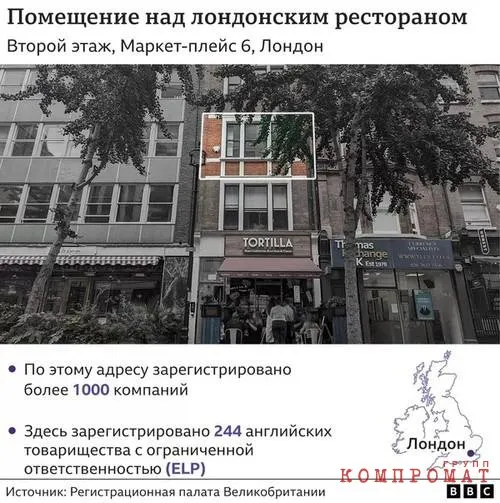
About 800 active companies are registered at this address, making it one of the most used ELP addresses in the UK. Over the past five years, over 240 ELPs have been registered here.
A piece of paper inserted into the intercom button shows only one company – 1000 Apostilles Ltd, owned by Ineta Utinane from LAS.
LAS mentioned that the lease on this space expired this year.
Another popular ELP address is in Bristol.
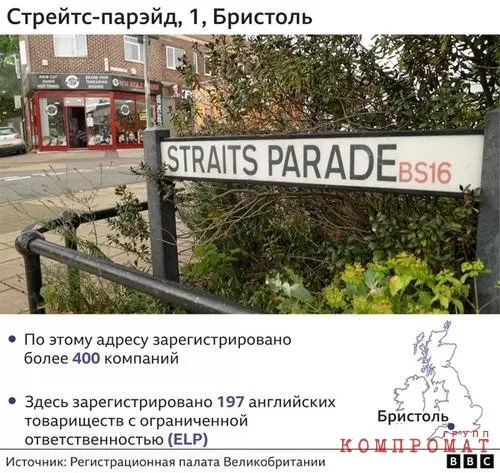
Now at 1 Straits Parade in the Fishponds district, there is a Turkish barbershop.
Another company formation agency, Arran, used this address and registered 197 ELPs.
Companies registered at this address have been connected to financial crimes.
Our investigation discovered that Rivelham LP, an English partnership registered in Bristol in 2013, was investigated by the FBI in the Boston Marathon bombing in the United States in the same year.
Rivelham LP was mentioned in suspicious activity reports prepared by Deutsche Bank as part of inquiries money movements linked to those accountable for that blast.
These reports, forwarded to the US Treasury, do not specify who owned this ELP, but documented its involvement in 116 questionable transactions totaling over $7.3 million in just one month, from December 2012 to January 2013.
The BBC attempted to reach out to the owners of Arran but did not receive any response.
While the identities of ELP partners can be found in paperwork filed with the UK Companies House, they are frequently anonymous entities registered in other countries, such as Belize and the Seychelles.
And even the individuals signing the paperwork of these entities are unlikely to be their actual owners.
Generally, these are nominal trustees who are compensated to sign paperwork, and typically they lack knowledge about the activities of the company.
For instance, Ruth Neidhart, a 71-year-old Swiss woman residing in Cyprus: she works as a ceramics artist, crafts porcelain dolls and jewelry, and occasionally organizes pottery painting sessions for children’s parties.
An examination of UK registration documents revealed that since 2016 she has signed paperwork for over 160 ELPs created by IOS, the company formation agency she worked for.
Another "zits-chairman" is Alexandru Terna, a Romanian citizen living in London. Terna has signed UK Companies House documents for at least 306 ELPs created by LAS for its clients.
In response to written inquiries from the BBC, Terna stated that his participation was arranged through LAS International or a related company "for and on behalf of the owners of all individual companies with whom we had fiduciary/nominal service agreements."
He adds:
“We’ve been warning the government for years about the issues with these non-transparent legal structures,” states Helena Wood of the Royal United Services Institute think tank. “As they say, transparency is the best disinfectant, and for all these English limited partnerships, we need a whole bucket of it.”
British politicians often vow to fix the numerous loopholes in anti-money laundering laws. However, the governments of the country are changing, and the gaps in the law have not disappeared.
As early as 2014, the government considered taking action against the ELP but failed to do so. The following year, the then prime minister David Cameron declared that he would not allow the UK to become “a safe haven for corrupt money from around the world”.
In 2018, the government acknowledged the risks associated with limited partnerships and — after several high-profile money-laundering scandals — raised concerns about their abuse by criminals.
After the start of the NWO in Ukraine by Russia Boris Johnson stated that he wanted to “open the nesting dolls of Russian companies” in order to reveal their true owners.
The government says it has no evidence of serious misuse of ELP. A government spokesman said: “The UK already has some of the most stringent anti-money laundering controls in the world and it is imperative that we continue to improve our controls to deal with criminals abusing UK entities.”
However, this modernization does not appear to include closing the loophole that allows limited partnerships to not disclose information about their true owners or beneficiaries.
